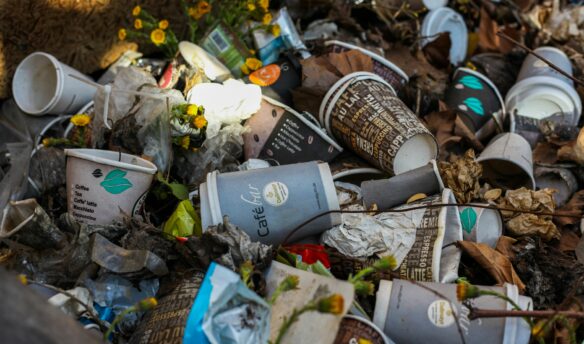Why is the SCA taking over the Q grader exam? Your guess is as good as ours. Plus, Starbucks is accused of using forced labor on its coffee farms, and a network of coffee technicians takes a stand on ethical coffee equipment repair.
‘The SCA Just Took Over The Q Grader Exam’ – via Sprudge
In what the two organizations are calling “a historic partnership,” the Specialty Coffee Association (SCA) is taking over management of the Q Grader program from the Coffee Quality Institute (CQI).
For over two decades, the CQI has administered the Q Grader program. The program is a rigorous professional certification that has trained thousands of coffee professionals to build the sensory skills necessary to evaluate and assess coffee quality.
Now, the CQI is handing over control to the SCA, which will “evolve the content” of the Q program to “provide better support and more accessible educational opportunities to the coffee industry,” according to a press release.
This “evolved” certification will be based on the SCA’s Coffee Value Assessment (CVA), the organization’s updated cupping standards. The goal of the CVA is to move evaluation away from a single 100-point score and toward a more holistic appreciation of coffee’s value.
“Coffee is more than a score. The partnership between SCA and CQI to evolve the Q Grader program is the latest milestone towards delivering on the SCA’s purpose to make coffee better,” said SCA CEO Yannis Apostolopoulos in the announcement. “Upon completion of the program, Q Graders holding the evolved, CVA-based license will set the standard for modern coffee evaluation.”
Because news broke just before the start of the SCA Expo conference in Houston, people (including us) are still trying to figure out what this move means. The reaction thus far on social media has been mostly either confused or negative. Some have gone to the comments section on the SCA’s Instagram announcement post to raise their concerns.
Some have cited concerns over additional costs (the Q training program is already costly). Others expressed confusion over what the shift could mean for their existing certification. Some expressed frustration that the SCA is focusing on acquiring the Q grading program and not addressing concerns over the current coffee price crisis or the threat of tariffs to the coffee industry.
The CQI has an FAQ page that responds to some questions, but many remain unanswered—keep an eye out for another patented Fresh Cup Explainer shortly.
‘Forced Labor Taints Brazilian Coffee, Say Complaints to U.S. Authorities’ – via the New York Times
Brazil is the world’s largest coffee producer, and much of that coffee ends up in the United States. Now, Ephrat Livni for the New York Times reports that two advocacy groups have filed a pair of legal challenges, alleging that some of the Brazilian coffee purchased by large U.S. brands is produced using forced labor and human trafficking.
A group called the International Rights Advocates (IRA) filed a federal lawsuit against Starbucks on behalf of eight Brazilian workers, alleging that they were trafficked and forced to work in “slavery-like conditions” on farms within the coffee giant’s supply chain.
The suit seeks to gain class action certification to represent thousands of workers that, IRA claims, have worked under similar conditions on farms affiliated with Cooxupé, Brazil’s largest cooperative and a Starbucks supplier. There are over 300,000 coffee farms in Brazil and more than 18,000 within Cooxupé’s supplier network.
“Starbucks needs to be accountable,” Terry Collingsworth, founder of IRA, told Livni. “There is a massive trafficking and forced labor system in Brazil,” from which Starbucks benefits, Collingsworth said. Starbucks denied the allegations.
Investigators have found similar issues on Starbucks-linked farms in Brazil, Guatemala, and China in recent years.
In a separate filing, the nonprofit Coffee Watch petitioned the U.S. Customs and Border Protection (CBP) to block coffee imports from Brazil from brands including Starbucks, Nestlé, Jacob Douwe Egberts, Dunkin, Illy, and McDonald’s. The group wants CBP to invoke Section 307 of the Tariff Act, which prohibits importing products linked to forced labor.
“Every time consumers pay inflated prices for their daily coffee, they unknowingly support a system that violates the most basic human rights that Americans hold dear,” Etelle Higonnet, founder and director of Coffee Watch, said in a statement. “Companies making billions in profits have had decades to fix this problem but have chosen profit over people.”
‘The Service Layer Co-Op (SLC) is Building a National Network of Coffee Techs’ – via Daily Coffee News
Finding a good technician to service coffee equipment is a hugely important and often underappreciated aspect of running a coffee business.
To help with this, a group of U.S.-based techs have joined together to create the Service Layer Cooperative (SLC), a nationwide network of independent coffee equipment technicians. Nick Brown reports for Daily Coffee News that the goal is to connect coffee businesses with qualified local technicians—the co-op’s website has a map that shows the breadth of their coverage.
The cooperative initially began as a Discord group for coffee equipment techs. The SLC wants to set standards and advocate for its members, as well as offer continuing education to improve the quality of coffee technicians nationwide through in-person and virtual training programs. “This is just to start. We’re hoping to flesh out more benefits and offerings as the organization matures,” board member Spencer Perez told Brown.
The group also took an ethical stance regarding venture capital and private equity in coffee. “As operational commitments go, SL members cannot work for or share ownership with VC/PE parties,” Perez said.
There has been a marked increase in private equity and venture capital groups buying into the industry over the past decade: we often report these acquisitions and purchases in the newsletter. Just last week, we shared a story on Fairwave Holdings purchasing the North Carolina-based Black & White Roasters.
“These interests, more often than not, are a scourge against collective wellbeing for the people who work hard in local communities to make great coffee happen,” Perez said.
More News
‘Spent Coffee Used to Create New Gym Equipment’ – via Global Coffee Report
‘Be More Judgmental With The WCC’s News Judge Skills Program’ – via Sprudge
‘Fellow Launches High-End Home Machine, the Espresso Series 1’ – via Daily Coffee News
‘Coffee Tariff Exemption Request Well Received by US Government, National Coffee Association Boss Says’ – via Reuters
‘Arabica Coffee Futures Gain Over 9% in Three Days Approach the $4 Mark Again’ – via Comunicaffe
‘South LA Cafe Owner Sues LAPD for Excessive Force’ – via Fox 11 Los Angeles
The Week in Coffee Unionizing
Last week, we brought you news that workers at Anodyne Coffee Roasting Co. in Milwaukee, Wisconsin, were unionizing. Workers wanted to join the Milwaukee Area Service and Hospitality Workers Union (MASH) and sent a letter to Fairwave Holdings, the private equity-backed company that bought Anodyne in 2023, requesting voluntary recognition.
Fairwave declined to bargain, reports Nick Rommel for Wisconsin Public Radio (WPR). They claimed that MASH didn’t represent a majority of Anodyne workers. The letter states that 47 of 50 eligible workers had signed union membership cards—now 50 have signed, according to MASH president Peter Rickman.
Rommel writes that workers at Anodyne were initially hopeful when Fairwave bought the company. Things quickly changed. “At first, there were some positives,” training manager Danielle Williams told WPR. “Now, especially in the last year, we’ve just seen things go in the opposite direction.”
Cold brew production moved to Kansas City, where Fairwave is based, and the resulting product “tastes completely different than it used to,” according to barista Sabrina Prochaska. Workers claim that base pay for future hires was lowered from $15 to $12, and Prochaska said that current employees struggle to get raises.
Workers point to a lack of communication and a new top-down hierarchy, leaving them little say in how the company is run. “It’s far less democratic,” Williams said.
In a statement to WPR, Isaac Hodges from Fairwave said, “FairWave is proud of our Anodyne team. We believe in a fair and inclusive workplace where everyone is heard and valued. We are committed to open communication and learning from each other.”
Meanwhile, Starbucks union delegates have voted overwhelmingly to reject the company’s latest contract proposal. Although they had reached tentative agreements on several issues, such as workplace safety and attendance policies, 81% of delegates voted no on the latest contract because the company’s offer of a 2% annual wage rise was insufficient.
“Union baristas are asking Starbucks to invest in our wages and benefits, which can be done in a number of ways, and that fundamentally means putting more money into the contract,” union delegate Michelle Eisen said in a statement. Starbucks told Bloomberg that the union gave delegates “an incomplete framework” to vote on but that the company “remains optimistic” that the two sides can finalize a “fair and equitable” contract.
Beyond the Headlines
‘David Lalonde Issues Worldwide Initiative, Coffee For Palestine’ by Ashley Rodriguez
‘A Planned E.U. Rule Has Coffee Growers in Ethiopia Scrambling’ by Shola Lawal
















